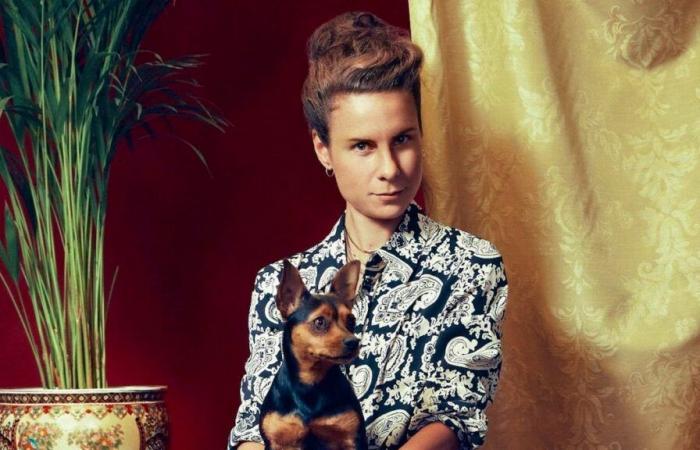He was asked to write a book. She returned a UFO, handwritten on paper stuffing from boxes of dog food. Funny, sincere and full of anecdotes. With photos and amazing drawings. Éditions Favre kept everything. And we loved it.
In “Phanee de Pool”, Fanny Diercksen, her real name, recounts her childhood, her years in the police and her career as a singer-songwriter full of distinctions and doubts. The resident of La Neuveville (BE), almost 36 years old, touches the heart as much as her songs hit the mark.
She gives herself away, before a year 2025 when the concert route will take her for the first time to South America.
How do you define this book? Is it an autobiography? A diary? An indefinable exercise?
Artisanal. It’s like what I’ve been doing all along with my songs. It seems very messy, but for the mess to be successful, it has to be very organized. I think the word “UFO” fits quite well.
At the beginning of the book, you wish yourself “good luck”, you also write that you had difficulty getting started with the exercise. For what?
Because I was putting a lot of pressure on myself. Because I told myself that I had to write a book like all people do, with beautiful sentences. I, who love words, verbs, sounds, rhymes, wanted something perfect. But it’s not the one who writes songs who writes this book, it’s the one who lives behind it all. So, I kept a language that is very close to mine. And there is a second part which contains the lyrics of my compositions and which is much more elaborate.
And you didn’t understand why Éditions Favre asked you to write a book, right?
Edit my song lyrics, why not, but I didn’t imagine that I would have to put my paw in the middle. The proposal was made to me before Covid and I pushed it back and pushed it back. I didn’t feel credible in this exercise, I told myself that I had nothing to say, that no one would be interested. And I finally started, and I realized that it’s a great outlet. In this book, I spat out things that I had never said to anyone, that I had not digested myself.
“My head is a little on edge, but I think it suits me well”
Through your book, we realize that, in your head, things are constantly going in all directions. It’s difficult to live with.
It’s difficult to live with when you take it as something hard to live with. I accept it. I have an entourage who knows me and who accepts that too. I’m very lucky with it. It’s quite funny, even: I can be in a hyper-serious discussion and still be thinking 36,000 completely crazy things. It can be described as an attention disorder, but I refuse to say I have that. Otherwise, I let myself be guided by that. My head is a little woozy, but I think it suits me well.
Your mom and your dad, who is also your manager, are the two most important people in your life and your career. Can you tell us more about this family business?
It’s all year round. The moments when we manage to cut it are when mom bakes us a cake and she says to us: “There, we don’t work, we enjoy, please.” With Dad, we tend to always talk about work. Mom, it’s the guardrail. I think she wants to rediscover the osmosis of a real family where everyone has their job.
Have you considered one day changing your professional environment, emancipating yourself from your parents?
I said from the beginning that as long as my parents had the opportunity to experience this with me, they would take priority. We’ve already had big record companies offering us incredible things. But, for me, the sine qua none condition was that Dad could be in the loop. I have this need. On the one hand to pay tribute to everything we have built together. He took a monumental risk by giving up his entire life to devote it to mine. And on the other, to be able to tell myself until my old age that everything I had to offer my parents, I offered it to them.
There is the arrival two years ago of your dog, Léone, which changed your life too…
She taught me so many things. Working in the police had already calmed me down a lot when it came to complaining. I realized that everything was going very well in my life, compared to that of the people with whom I had to intervene. Above all, Léone made me realize that there was no point in waiting for the future or focusing on the past, but that we must be in the present. She does it unconsciously, but I owe her a debt of gratitude.
Speaking of the police, you say in your book that you spent seven years there outside of your comfort zone. What was it like to get back into writing?
Nothing. It was even rather pleasant to relive his memories. What was very hard, however, was writing about my journey from childhood to entering the police academy. Like the exams I failed. I realized that I had zero nostalgia for my past. I’m so happy to be 35 and no longer the young student I was.
Your book is full of anecdotes, like the one where you say you helped an undertaker lift a deceased person and juice flowed from his body…
In the police, I saw an astronomical quantity of corpses. They called me the Scythe. When I was on duty, we could be sure that there would be dead people. I attracted them! But I never got used to it, I learned to tolerate it. And, above all, I was an actress rather than a spectator. When we came across an accident, I acted, I tried to do everything to save or, if necessary, I picked up.
Another anecdote: a large tractor with a manure cart deliberately dumped its load on your car. For what?
I was really upset. He wasn’t moving forward, I couldn’t pass him and I lost my patience. I gave him a huge middle finger while honking the horn. Suddenly, I no longer saw my way: he had activated the spreading. I had to call a mechanic to come and free me. In the end, it is a very educational experience. Since that day, I have never gotten angry while driving.
You also say that you “spent in 365 days” all the money that your parents had put in an account since your birth. How did you spend it?
By living the high life! A pair of shoes, a restaurant with friends, don’t think twice! I also paid the professional musicians in my trio when we played concerts, the fees were not enough. The problem was that I had no money coming in. I clearly didn’t manage my money. But my parents never held it against me.
“This book was like a date of the first evening, when you meet”
You always take Cenovis with you on tour, is that true?
Yes, always, because I have never come across a hotel in which there is one. A breakfast without toast at Cenovis is not an option. On the other hand, there is not one person to whom I introduced it who liked it. And I am very disappointed. This is when I tell myself that I haven’t surrounded myself with the right people. (Laughs.)
Will your book be followed by another?
It’s possible, because this book was like a date of the first evening, when you get to know each other. If my career continues, I would like to tell and illustrate it. But if it doesn’t happen, it doesn’t matter.
What do you plan for 2025?
I’m going to have a busy year. Many concerts are planned: there will be a return to Paris in January and… A tour of South America! I still don’t understand how this is possible. With mixed enthusiasm, since my love of travel is not fully developed. (Laughs.) Above all, I’m going to start creating some music again, because I’ve abandoned my guitars and my rhyming dictionary.
Phanee de Pool will be signing in bookstores on Friday December 20 at 2 p.m. at Fnac in Bienne, Saturday December 21 at 10:30 a.m. at Payot La Chaux-de-Fonds and at 2 p.m. at Payot Neuchâtel.






